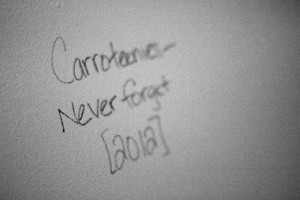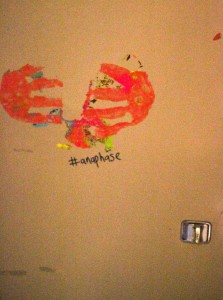Burling is known for its sometimes creative, sometimes creepy, sometimes crude bathroom graffiti. The S&B assembled an inter-disciplinary panel of majors—Gender, Women’s and Sexuality Studies (Leslie Bean ‘13), Sociology (Will Jackson ‘13) and Anthropology (Dakota Maxwell-Jones ‘13)—to analyze them. Here are their reflections:

While the use of the word “b*tch” has proven to be quite contentious, it must be noted that the word has the ability to empower and oppress, depending on context and intention; however, in this case, it appears as though whoever wrote “Uz a [Basic] or [Bad] B*tch” was trying to appeal to some sort of social empowerment. The author of this message leaves the door open for two possibilities. If one identifies as a “Basic B*tch,” then she or he is “a bum-ass who think they the shit but really ain’t (Urban Dictionary).” If one self identifies as a “Bad B*tch,” then she or he is “totally mentally gifted and usually also fine as hell.” (also Urban Dictionary). The message is based off of the assumption that the word “b*tch” can exist outside of its negative context.
—Will Jackson
The linguistic use of the word “uz” implies a modern take on describing women. A [basic] b*tch refers to a female who thinks she is better than others when in reality she occupies a less than prestigious/important social role. A [bad] b*tch is recognized as a classy female who garners attention and respect for success and good looks. The binary alludes to a new presentation of females on campus.
—Dakota Maxwell-Jones

As background info for all you youngsters, Caroteenies were packets of mini carrot sticks that used to be an integral part of the Outtakes experience, arguably on par with the piece of fruit. Caroteenie nostalgia remains a strong bonding activity for older Grinnellians, usually when getting an Outtake and weeping softly at the hole left in their heart by their absence. This particular piece of graffiti provides an excellent example of the unusual phenomenon of graffiti punctuation in the form of the hyphen; this functions as a transition to differentiate between the ideas of the first and second lines. The alternative interpretation, “Caroteenies Never Forget,” provides an obviously different message although a still valid one because Caroteenies will never forget the injustice of their early demise from the Grinnell College Dining Services. The signature indicates that this particular note was written by a member of the class of 2012, meant to represent the class as a whole to the remaining, current Grinnell College student body. However, since the overall message could only really be understood by members of the class of 2013 (the last class to have experienced the beauty of Caroteenies) it seems like this particular piece of graffiti is actually a reminder of an inside joke and a sort of love letter from [2012] to [2013].
—Leslie Bean

I am not entirely sure what the purpose or motive of this message was. The Grinnell community is made up of a diverse collective of individuals, some of whom are precocious, but I would argue that most Grinnellians are awesome in their own unique way. It is unfortunate that whoever wrote this lacked a sense of belonging to the Grinnell community, but I believe there are other forms of expression and communication that could have served as better outlets than the wall of a Burling bathroom. There is no productive purpose in berating people that may share a similar sentiment about this college, but I can provide some reassurance: Grinnell is a cosmos for something that does not exist. #YOLO.
—Will Jackson
A narrative of assumed agency of an individual contrasted against a conceived superior force (i.e. danger, love, homework). This expressed agency is a voice for those traditionally unaware of their own power. The vocalization of the phrase, usually yelled, reinforces this idea to justify ludicrous actions. The vocalization, an extension of bodily power, solidifies the individual’s relationship to risk within a group setting. It’s a chance to prove oneself. Its purpose: remind Grinnellians to embrace what their ideas, no matter how flawed they are at the moment.
—Dakota Maxwell-Jones

A reflection of the significance of the production of knowledge. This is perhaps related to the struggle of postmodern thought. Academia has its epistemological crises which force students to ponder about what these crises means, which leads to their own crises and a devaluing of themselves. There’s more to life than thinking of questions to answer more questions. Go play Zelda.
—Dakota Maxwell-Jones
No snarky comments here, just something good to remember. I like to go to this stall when I need a break from long, tortuous periods of Burling blitz writing.
—Leslie Bean

This is an actual example of cellular division that you can watch in action and observe the natural ecology of the Burling wilderness. The reason why there are multiple stalls in the basement bathrooms is because the original parental stall underwent division, thereby creating offspring that colonized the bathroom. Right now, the population of stalls has reached its carrying capacity based on available resources and current conditions, which is why the number of available stalls remains stable. Potential future experiments (pay attention, BIO 150ers!) could examine the effects of manipulating the available resources (space, food availability, etc.) and/or environmental conditions on the birth and death rates of individuals in this population.
—Leslie Bean




























































